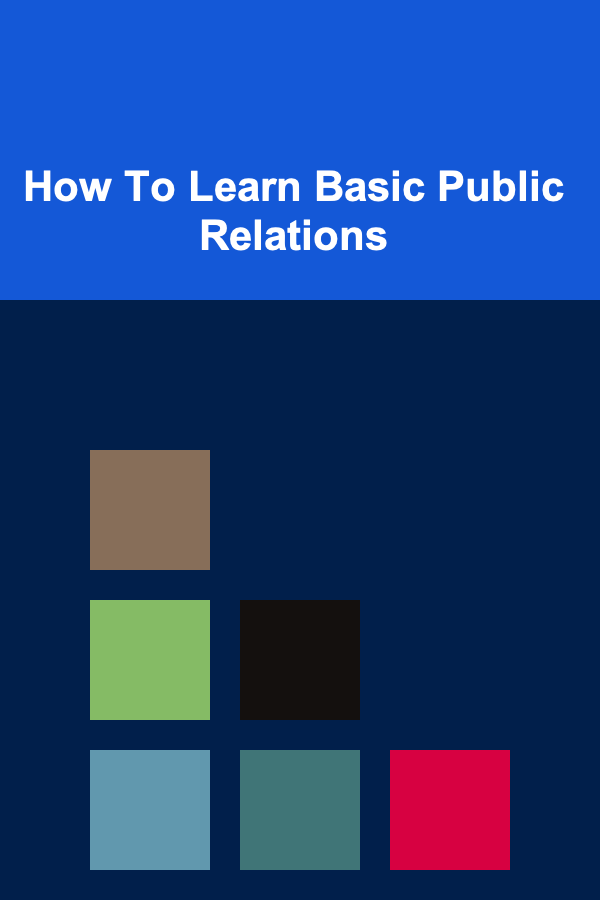
How To Learn Basic Public Relations
ebook include PDF & Audio bundle (Micro Guide)
$12.99$5.99
Limited Time Offer! Order within the next:

Public Relations (PR) is a critical component of effective communication between an organization and its stakeholders, including customers, employees, media, and the general public. Learning basic public relations skills is crucial for anyone looking to build their brand, influence public opinion, or manage crisis situations effectively. This article explores the essential steps and strategies to learn the fundamentals of public relations.
Understanding Public Relations
At its core, Public Relations involves managing the spread of information between an organization and its audience. It's about building and maintaining a positive reputation for an individual, company, or organization. Unlike advertising, which involves paid media placements, PR focuses on earned media, where the organization's message is communicated through media channels without direct payment. The main goal is to create and nurture a favorable public image.
Key Components of Public Relations:
- Media Relations: Establishing and maintaining relationships with journalists and media outlets to gain favorable media coverage.
- Crisis Communication: Managing communication during a crisis or emergency to protect an organization's reputation.
- Branding and Reputation Management: Ensuring that an organization's values, mission, and message align with public expectations.
- Event Planning: Organizing events that will help promote an organization, whether it's product launches, press conferences, or charity events.
- Internal Communications: Managing how information is communicated within an organization, especially to employees.
Why PR Matters
Public relations helps organizations build trust, attract customers, and maintain a good reputation. A strong PR strategy can increase visibility, cultivate loyalty, and establish credibility, making it an essential part of any business strategy.
Key Skills Needed to Learn PR
Before diving into the practical aspects of public relations, it's important to first understand the skills you need to develop. Here are some of the core competencies required to excel in PR:
1. Writing Skills
One of the most crucial skills in PR is writing. Public relations professionals create press releases, articles, social media posts, blog entries, speeches, and other forms of written communication. Writing well ensures that the message is clear, concise, and persuasive.
- Press Releases: A press release is a critical PR tool used to communicate newsworthy information to the media. It should be written in a journalistic style, featuring the most important information first, followed by supporting details.
- Speeches and Statements: Crafting compelling speeches that resonate with the audience is an essential skill in PR. These speeches should reflect the brand's values and align with its goals.
2. Communication Skills
Effective communication is the backbone of PR. Being able to communicate clearly and persuasively with different audiences, including journalists, clients, and the public, is essential.
- Public Speaking: This is vital for anyone in PR, as they may need to address the media, clients, or even large groups of people at events.
- Negotiation: PR professionals often need to negotiate with journalists or stakeholders to get favorable media coverage or address concerns effectively.
3. Social Media Management
In today's digital age, social media plays a significant role in public relations. Understanding how to manage and leverage platforms like Twitter, Facebook, Instagram, and LinkedIn is crucial to creating and maintaining a positive public image.
- Content Creation: Developing content that resonates with your audience and is aligned with the brand's message is key.
- Engagement: Actively responding to inquiries and feedback on social media platforms is a great way to engage with your audience and maintain a positive image.
4. Research Skills
PR professionals need to understand their target audience, competitors, and industry trends. Conducting market research, media monitoring, and competitive analysis is crucial to create effective PR campaigns.
- Media Research: Identifying the right media outlets and journalists to target is essential for gaining exposure.
- Audience Insights: Understanding the demographics, preferences, and behaviors of your audience allows you to tailor messages effectively.
5. Crisis Management
One of the most challenging aspects of PR is managing crises. Whether it's a product recall, a public scandal, or negative media attention, handling a crisis effectively is essential to safeguarding an organization's reputation.
- Proactive Planning: Having a crisis communication plan in place ensures you are prepared for any situation that could arise.
- Transparency and Timeliness: When a crisis happens, responding quickly and transparently can help mitigate damage and rebuild trust.
Steps to Learn Basic Public Relations
Now that you understand the skills required for a career in public relations, let's explore the steps you can take to learn and master the basics of PR.
1. Educate Yourself About the Basics
The first step in learning public relations is to get familiar with the core concepts and theories behind the profession. You can do this through various methods:
- Books : Many books have been written on PR, offering valuable insights into its principles, practices, and strategies. Some classics include "Public Relations: Strategies and Tactics" by Dennis L. Wilcox and "The New Rules of Marketing and PR" by David Meerman Scott.
- Online Courses: There are numerous online platforms like Coursera, Udemy, and LinkedIn Learning that offer courses in PR fundamentals.
- Industry Blogs and Websites: Following PR blogs and websites, such as PRWeek, The Holmes Report, and MediaBistro, can keep you updated on trends and industry news.
2. Develop a PR Plan
Learning PR involves not just theoretical knowledge, but also practical application. One way to gain practical experience is by developing a PR plan for a hypothetical brand or business.
- Target Audience: Identify your target audience and understand their needs, preferences, and behaviors.
- Messaging: Define the core message you want to communicate. Your message should align with the values of the brand and address the interests of your audience.
- Media Strategy: Determine which media outlets are best suited for your message. Should you target local newspapers, television, or digital platforms?
- Timeline and Budget: Set a timeline for your PR activities and determine how much you're willing to invest in executing the plan.
3. Gain Hands-On Experience
The best way to learn public relations is by gaining real-world experience. Here's how you can start gaining hands-on experience:
- Internships: Look for internships at PR agencies or in-house PR departments. An internship will give you a first-hand look at how PR works in practice.
- Freelance Projects: Offer PR services to small businesses or non-profit organizations to build your portfolio and gain practical experience.
- Personal Branding: Start building your own personal brand using the principles of PR. Develop a social media presence, write blogs, or participate in public speaking to practice what you've learned.
4. Network with PR Professionals
Networking is a crucial part of learning PR. By connecting with experienced PR professionals, you can gain insights, advice, and potential job opportunities. Here are some tips for networking in PR:
- Attend PR Events: Conferences, workshops, and networking events are great places to meet professionals in the industry.
- Join PR Associations: Becoming a member of organizations such as the Public Relations Society of America (PRSA) can help you stay connected and informed about industry trends.
5. Analyze Successful PR Campaigns
Study successful PR campaigns to understand what worked and why. Look for case studies or campaigns from top PR agencies and brands. Analyze their messaging, media strategy, and the impact they had on their target audience. Some well-known campaigns to research include:
- Nike's "Just Do It" Campaign
- Coca-Cola's "Share a Coke" Campaign
- The ALS Ice Bucket Challenge
6. Learn from Mistakes
PR is a field where learning from mistakes is part of the process. Analyze unsuccessful campaigns or mistakes made by other professionals to learn what went wrong and how it could have been handled differently. Mistakes provide valuable lessons that help improve your skills over time.
Conclusion
Public Relations is a powerful tool that can significantly impact an organization's success. By understanding the fundamentals of PR, developing essential skills, and gaining practical experience, you can start your journey toward mastering this dynamic field. PR is about building relationships, managing reputations, and communicating effectively with the right audiences. Whether you are a student, a professional, or a business owner, learning basic public relations skills will undoubtedly enhance your ability to create a positive public image and navigate the complex world of communication.
Start with education, practice regularly, and continuously seek to improve your skills and understanding of the field. With dedication and the right approach, you can succeed in the ever-evolving world of public relations.

Ecology and Environment: Principles of Sustainable Living
Read More
How to Create a System for Managing Home Projects
Read More
How to Handle Unforeseen Issues During a Home Renovation
Read More
How to Organize a Wine and Cheese Tasting Party at Home
Read More
How to Style Your Dining Room for a Beautiful Holiday Feast
Read More
How To Build a Brand That People Trust
Read MoreOther Products

Ecology and Environment: Principles of Sustainable Living
Read More
How to Create a System for Managing Home Projects
Read More
How to Handle Unforeseen Issues During a Home Renovation
Read More
How to Organize a Wine and Cheese Tasting Party at Home
Read More
How to Style Your Dining Room for a Beautiful Holiday Feast
Read More